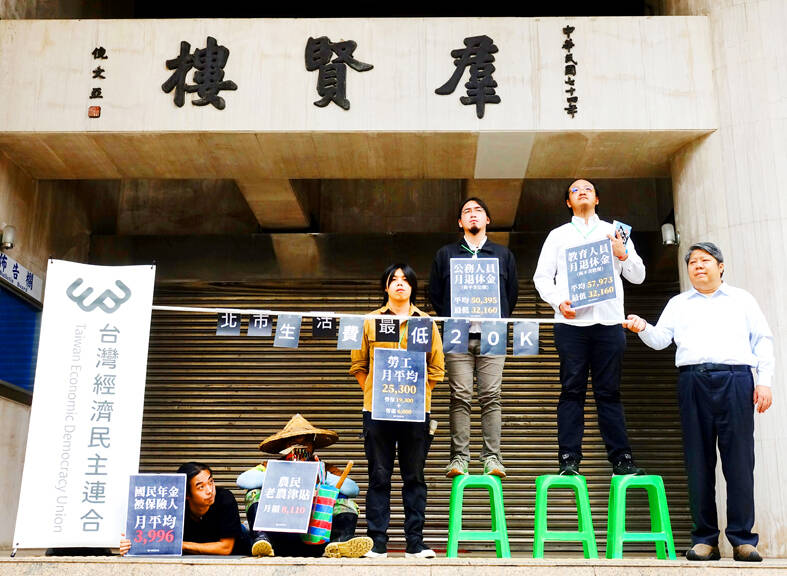The push by the Chinese Nationalist Party (KMT) to suspend pension reforms amounts to “robbing the poor to give to the rich,” resulting in wider income gaps, and injustice against farmers and laborers, the Economic Democracy Union (EDU) said.
EDU members protested outside the legislature yesterday, a day after the bill to suspend pension reforms passed its first reading with backing from the Taiwan People’s Party.
The bill would roll back reforms to the pension system launched by the Democratic Progressive Party government in 2017, which was aimed at securing solvency for the state pension fund, as the previous pension scheme allowed civil servants, military personnel and teachers to “contribute little, retire early and receive generous benefits” at the expense of other workers and farmers, the activist group said.

Photo: Tien Yu-hua, Taipei Times
EDU researcher Huang Ting-wei (黃亭偉) said that retired public school teachers receive an average monthly pension of NT$57,973, while civil servants get a monthly average of NT$50,395.
The government defines the lowest standard of living expenses this year as requiring NT$20,379 per month in Taipei and NT$15,515 elsewhere, with incomes below these figures considered to be low-income households, Huang said.
“Civil servants and teachers — retired and not working — are getting more than NT$50,000 from their pensions, above the average salary, yet the pensioners claim to be poor and to have difficulty living, and so they fight pension reform,” he said.
“Taiwan’s more than 500,000 farmers receive only a monthly average of NT$8,110 in retirement benefits,” Huang added.
“More than 1.9 million working class retirees receive an average of NT$25,300 in retirement benefits. Of these, more than 180,000 retired workers are getting by on a monthly pension of less than NT$10,000,” he said.
Huang said that at the end of last year, Taiwan had 4.48 million people over the age of 65, with about half of them receiving less than NT$8,000 in retirement benefits.
“This NT$8,000 is far below the NT$50,000 received by retired civil servants,” Huang added.
The legislature should amend the Act Governing the Allocation of Government Revenues and Expenditures (財政收支劃分法) to guarantee a minimum monthly retirement benefit of NT$8,000 for all citizens without regard to occupation, the EDU said.

Three Taiwanese airlines have prohibited passengers from packing Bluetooth earbuds and their charger cases in checked luggage. EVA Air and Uni Air said that Bluetooth earbuds and charger cases are categorized as portable electronic devices, which should be switched off if they are placed in checked luggage based on international aviation safety regulations. They must not be in standby or sleep mode. However, as charging would continue when earbuds are placed in the charger cases, which would contravene international aviation regulations, their cases must be carried as hand luggage, they said. Tigerair Taiwan said that earbud charger cases are equipped

Foreign travelers entering Taiwan on a short layover via Taiwan Taoyuan International Airport are receiving NT$600 gift vouchers from yesterday, the Tourism Administration said, adding that it hopes the incentive would boost tourism consumption at the airport. The program, which allows travelers holding non-Taiwan passports who enter the country during a layover of up to 24 hours to claim a voucher, aims to promote attractions at the airport, the agency said in a statement on Friday. To participate, travelers must sign up on the campaign Web site, the agency said. They can then present their passport and boarding pass for their connecting international

UNILATERAL MOVES: Officials have raised concerns that Beijing could try to exert economic control over Kinmen in a key development plan next year The Civil Aviation Administration (CAA) yesterday said that China has so far failed to provide any information about a new airport expected to open next year that is less than 10km from a Taiwanese airport, raising flight safety concerns. Xiamen Xiangan International Airport is only about 3km at its closest point from the islands in Kinmen County — the scene of on-off fighting during the Cold War — and construction work can be seen and heard clearly from the Taiwan side. In a written statement sent to Reuters, the CAA said that airports close to each other need detailed advanced

The age requirement for commercial pilots and airline transport pilots is to be lowered by two years, to 18 and 21 years respectively, to expand the pool of pilots in accordance with international standards, the Ministry of Transportation and Communications announced today. The changes are part of amendments to articles 93, 119 and 121 of the Regulations Governing Licenses and Ratings for Airmen (航空人員檢定給證管理規則). The amendments take into account age requirements for aviation personnel certification in the Convention on International Civil Aviation and EU’s aviation safety regulations, as well as the practical needs of managing aviation personnel licensing, the ministry said. The ministry